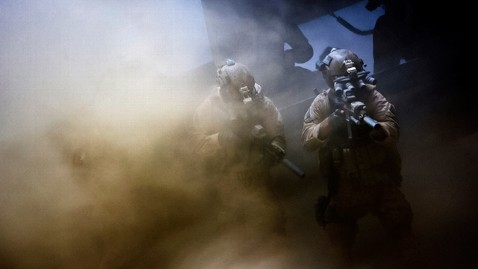Jane J. Lee
Although shark pups are born with all the equipment they'll ever need to defend themselves and hunt down food, developing embryos still stuck in their egg cases are vulnerable to predators. But a new study finds that even these baby sharks can detect a potential predator, and play possum to avoid being eaten.
Every living thing gives off a weak electrical field. Sharks can sense this with a series of pores—called the ampullae of Lorenzini—on their heads and around their eyes, and some species rely on this electrosensory ability to find food buried in the seafloor. (See pictures of electroreceptive fish.)
Two previous studies on the spotted catshark (Scyliorhinus canicula) and the clearnose skate (Raja eglanteria)—a relative of sharks—found similar freezing behavior in their young. But new research by shark biologist and doctoral student Ryan Kempster at the University of Western Australia has given scientists a more thorough understanding of this behavior.
It all started because Kempster wanted to build a better shark repellent. Since he needed to know how sharks respond to electrical fields, Kempster decided to use embryos. "It's very hard to test this in the field because you need to get repeated responses," he said. And you can't always get the same shark to cooperate multiple times. "But we could use embryos because they're contained within an egg case."
Cloaking Themselves
So Kempster got his hands on 11 brownbanded bamboo shark (Chiloscyllium punctatum) embryos and tested their reactions to the simulated weak electrical field of a predator. (Popular pictures: Bamboo shark swallowed whole—by another shark.)
In a study published today in the journal PLoS One, Kempster and his colleagues report that all of the embryonic bamboo sharks, once they reached later stages of development, reacted to the electrical field by ceasing gill movements (essentially, holding their breath), curling their tails around their bodies, and freezing.
A bamboo shark embryo normally beats its tail to move fresh seawater in and out of its egg case. But that generates odor cues and small water currents that can give away its position. The beating of its gills as it breathes also generates an electrical field that predators can use to find it.
"So it cloaks itself," said neuroecologist Joseph Sisneros, at the University of Washington in Seattle, who was not involved in the study. "[The embryo] shuts down any odor cues, water movement, and its own electrical signal."
Sisneros, who conducted the previous clearnose skate work, is delighted to see that this shark species also reacts to external electrical fields and said it would be great to see whether this is something all shark, skate, and ray embryos do.
Marine biologist Stephen Kajiura, at Florida Atlantic University, is curious to know how well the simulated electrical fields compare to the bamboo shark's natural predators—the experimental field was on the higher end of the range normally given off.
"[But] they did a good job with [the study]," Kajiura said. "They certainly did a more thorough study than anyone else has done."
Electrifying Protection?
In addition to the freezing behavior he recorded in the bamboo shark embryos, Kempster found that the shark pups remembered the electrical field signal when it was presented again within 40 minutes and that they wouldn't respond as strongly to subsequent exposures as they did initially.
This is important for developing shark repellents, he said, since some of them use electrical fields to ward off the animals. "So if you were using a shark repellent, you would need to change the current over a 20- to 30-minute period so the shark doesn't get used to that field."
Kempster envisions using electrical fields to not only keep humans safe but to protect sharks as well. Shark populations have been on the decline for decades, due partly to ending up as bycatch, or accidental catches, in the nets and on the longlines of fishers targeting other animals.
A 2006 study estimated that as much as 70 percent of landings, by weight, in the Spanish surface longline fleet were sharks, while a 2007 report found that eight million sharks are hooked each year off the coast of southern Africa. (Read about the global fisheries crisis in National Geographic magazine.)
"If we can produce something effective, it could be used in the fishing industry to reduce shark bycatch," Kempster said. "In [America] at the moment, they're doing quite a lot of work trying to produce electromagnetic fish hooks." The eventual hope is that if these hooks repel the sharks, they won't accidentally end up on longlines.











